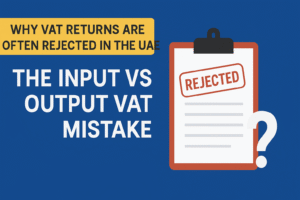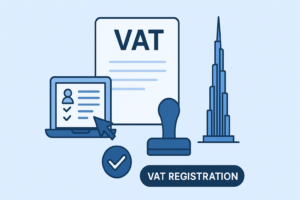Corporate Tax in the UAE marks a major shift in the country’s financial and business landscape. With the Federal Decree-Law No. 47 of 2022 introducing corporate tax, businesses are now required to register and comply with new tax regulations set by the Federal Tax Authority (FTA). Understanding the corporate tax registration process in the UAE is crucial for every company operating within the region to ensure legal compliance and avoid penalties.
This guide provides a step-by-step overview of how to register for corporate tax in the UAE, the documents required, and key deadlines for businesses.
What Is Corporate Tax in the UAE?
Corporate Tax (CT) is a direct tax imposed on the net income or profit of corporations and other businesses. Effective from June 1, 2023, the standard corporate tax rate in the UAE is 9% for taxable income exceeding AED 375,000, while income below this threshold is taxed at 0%, supporting small businesses and startups.
Key Features of UAE Corporate Tax:
- Applicable Rate: 9% on taxable profits above AED 375,000
- Threshold: 0% for income up to AED 375,000
- Authority: Federal Tax Authority (FTA)
- Effective Date: June 1, 2023
- Applicable Entities: Mainland companies, Free Zone entities (subject to conditions), and foreign businesses with UAE operations
Who Must Register for Corporate Tax in the UAE?
Corporate Tax registration is mandatory for all UAE-based businesses, including:
- Mainland Companies: Operating under the UAE Commercial Companies Law
- Free Zone Entities: Subject to compliance with qualifying criteria for 0% CT rate
- Foreign Companies: If they have a permanent establishment or generate income within the UAE
- Freelancers and Sole Proprietors: If their annual business income exceeds the taxable threshold
Exemptions may apply for:
- Government entities
- Extractive and non-extractive natural resource businesses
- Charitable organizations (if approved by the FTA)
Documents Required for Corporate Tax Registration
To register for corporate tax in the UAE, you’ll need to prepare and submit the following documents:
- Trade License Copy
- Emirates ID and Passport of the Owner/Partners
- Memorandum of Association (MOA) or Articles of Association (AOA)
- Business Contact Details – email, phone number, and address
- Financial Information – accounting period and financial statements
- Business Activity Details
- Tax Registration Number (TRN) (if VAT-registered)
Ensure all documents are valid and consistent with your trade license details to avoid registration delays.
Step-by-Step Guide to Corporate Tax Registration in the UAE
Step 1: Create an Account on the EmaraTax Portal
Businesses must first create an account on the EmaraTax platform — the official portal managed by the Federal Tax Authority.
Visit https://tax.gov.ae and log in using your UAE Pass or registered email ID.
Step 2: Access the Corporate Tax Registration Form
Once logged in, select “Corporate Tax” from the available tax types and click “Register.” The portal will display the electronic registration form.
Step 3: Complete Business Information
Fill in all required business details, including:
- Legal name of the entity
- Trade license number
- Type of business activity
- Financial year start and end dates
- Ownership structure and shareholders
Step 4: Upload Required Documents
Attach all necessary documents (as listed above) in the appropriate format. Ensure file clarity and size compliance with FTA guidelines.
Step 5: Review and Submit the Application
Double-check all entries for accuracy, as any inconsistencies may delay approval. Once confirmed, submit the registration form for review.
Step 6: Receive Corporate Tax Registration Number (TRN)
After approval, the FTA will issue a Corporate Tax Registration Number (CTRN). This number is crucial for filing corporate tax returns and maintaining compliance.
Corporate Tax Registration Timeline
The FTA has set registration timelines based on business types and license issuance dates. Generally:
- Existing companies should register before the start of their first tax period.
- New companies must register within 3 months of their incorporation or commencement of business.
Failure to register on time may result in administrative penalties up to AED 10,000.
Corporate Tax Compliance After Registration
Once registered, businesses must ensure continuous compliance by:
- Maintaining proper accounting records
- Filing annual corporate tax returns electronically via EmaraTax
- Submitting accurate financial statements based on international accounting standards
- Paying the due tax amount within the specified timeframe
The corporate tax return filing deadline is 9 months after the end of the relevant financial year.
Corporate Tax for Free Zone Companies
Free Zone businesses in the UAE can benefit from 0% corporate tax if they meet the “Qualifying Free Zone Person” (QFZP) criteria:
- Maintain adequate substance within the Free Zone
- Derive qualifying income (e.g., from trading with overseas or other Free Zone entities)
- Not conduct business with the UAE mainland
- Comply with transfer pricing regulations
Failure to meet these conditions may make the Free Zone business subject to the standard 9% tax rate.
Benefits of Corporate Tax Registration
While it introduces a new obligation, corporate tax registration offers several advantages for businesses in the UAE:
- Enhanced Credibility: Improves company reputation with clients and partners
- Global Alignment: Positions the UAE as a transparent and compliant global business hub
- Economic Growth: Encourages responsible business operations and financial reporting
- Tax Planning Opportunities: Enables businesses to legally structure finances for optimal tax efficiency
Common Mistakes to Avoid
When registering for corporate tax, avoid these frequent errors:
- Providing incomplete or inaccurate information
- Using outdated trade license or expired documents
- Missing the registration deadline
- Failing to understand free zone qualifying criteria
Ensuring accuracy and timely submission prevents unnecessary fines and delays.
Last Thoughts
Corporate tax registration in the UAE is an essential process for all businesses aiming to operate legally and efficiently under the country’s new tax framework. By following the step-by-step registration guide, preparing accurate documents, and meeting FTA deadlines, your business can achieve full compliance while benefiting from UAE’s competitive 9% tax regime.
If you’re unsure about your company’s eligibility or need help with corporate tax registration, consult with a registered tax agent or corporate service provider in the UAE to ensure smooth and error-free processing.





